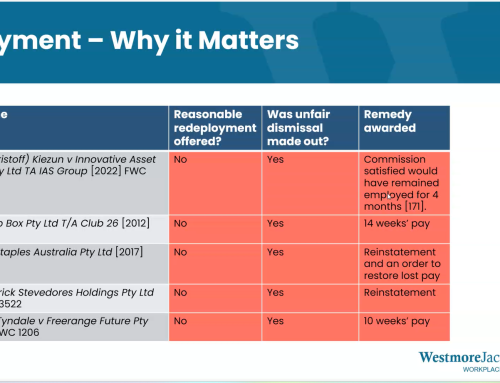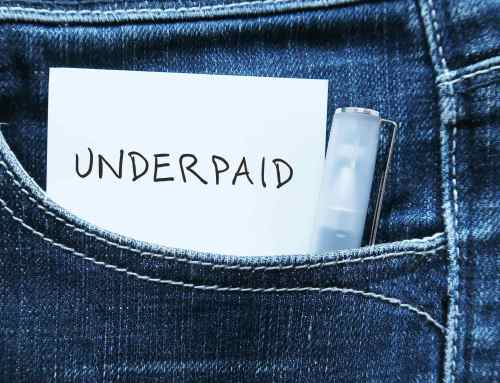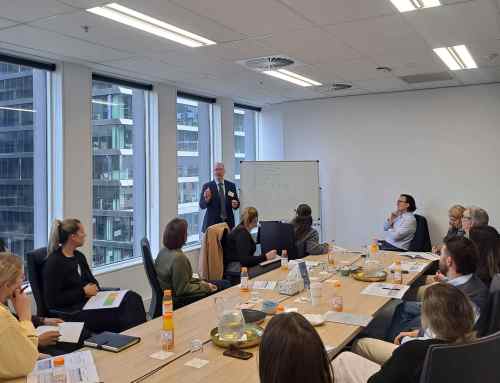 It is now easier for the Fair Work Ombudsman or employees to successfully sue franchisors and holding companies for contraventions by their franchisees and subsidiaries of fundamental employment rights under the Fair Work Act. However, there is a defence. If franchisors or holding companies can convince a court they took reasonable steps to prevent the contravention, then franchisors and holding companies will escape liable.
It is now easier for the Fair Work Ombudsman or employees to successfully sue franchisors and holding companies for contraventions by their franchisees and subsidiaries of fundamental employment rights under the Fair Work Act. However, there is a defence. If franchisors or holding companies can convince a court they took reasonable steps to prevent the contravention, then franchisors and holding companies will escape liable.
Liability of this type is nothing new. It has existed in some form since the Fair Work Act’s inception. What has changed is the introduction of a new provision called section s558B. It introduces a new, relatively low legal test by which franchisors and holding companies may be liable for certain breaches of the Fair Work Act by their franchisees or subsidiaries.
This article examines the changes, the pre-existing law, and what the differences are.
The changes
Holding companies and franchisors with a significant degree of influence or control over franchisees (“Responsible Franchisors”) now have broadened liability for contraventions of certain provisions of the Fair Work Act committed by their subsidiaries or franchisees.
Responsible Franchisors and holding companies who:
- knew, or could reasonably be expected to know, that a franchisee or subsidiary would engage in a contravention of the Fair Work Act; or
- at the time of the franchisee or subsidiary’s contravention could reasonably be expected to have known that the franchisee or subsidiary would engage in a contravention of the Fair Work Act of the same or similar character,
will be liable for a contravention of the newly introduced section 558B, unless the franchisor or holding company took reasonable steps to prevent the franchisee’s or subsidiary’s contravention. The maximum penalty for a contravention of Section 558B is 60 penalty units for an individual or 300 penalty units for a corporation (currently $12,600 and $63,000 respectively).
What are reasonable steps?
A Responsible Franchisor or holding company will not have contravened section 558B if they took reasonable steps to prevent the franchisee’s or subsidiary’s contravention. Whether reasonable steps have been taken, the court may have regard to, amongst other things, the following factors:
- the size and resources of the franchise or body corporate;
- the extent to which the Responsible Franchisor or holding company had the ability to influence or control the franchisee or subsidiary’s conduct in relation to the contravention, or contraventions of the same or similar nature;
- any action the Responsible Franchisor or holding company took towards ensuring the franchisee or subsidiary had reasonable knowledge and understanding of their obligations towards their employees under the Fair Work Act;
- the Responsible Franchisor or holding company’s arrangements (if any) for receiving and addressing possible complaints about alleged underpayments or other contraventions of the Fair Work Act; and
- the extent to which the Responsible Franchisor or holding company’s arrangements with the franchisee or subsidiary encourage or require the franchisee or subsidiary encourage or require compliance with the Fair Work Act or any other workplace law.
Pre-existing law
Under the pre-existing law it was and remains possible for the Fair Work Ombudsman or employees to pursue franchisors and holding companies for contraventions committed by their franchisees or subsidiaries. However, this is generally no easy task. Section 550 of the Fair Work Act provides that a person who was “involved in” a contravention of certain provisions of the Fair Work Act was taken to have also contravened that provision.
“Involved in” is a much higher test than the provisions discuss above under s558B. A franchisee or holding company is only taken to be involved in a franchisee or subsidiary’s contravention if they:
- aided, abetted, counselled or procured the franchisee or subsidiary’s contravention;
- induced the contravention, whether by threats or promises, or other means; or
- in anyway, directly or indirectly knowing concerned in or party to the franchisee or subsidiary’s contravention; or
- consipired with others to effect the franchisee or subsidiary’s contravention.
Section 550 still exists, and franchisors and holding companies may still be liable under it. In fact, with the introduction of the Serious Contravention regime the maximum penalty which may be ordered against franchisors and holding companies has been increased to 10 times the previous maximum if the contraventions amounted to a Serious Contravention.
Where do employers stand?
Below is a table which broadly compares the two provisions.
|
Pre-existing provision – section 550
|
New provision – section 558B | |
| Legal test: |
Harder to satisfy.
|
Easier to satisfy.
|
|
Provisions of the Fair Work Act for which a franchisor or holding company may be liable:
|
All civil remedy provisions in the Fair Work Act. (Basically, any provision in the Fair Work Act that a party can commence legal proceedings regarding).
|
Fundamental provisions of the Fair Work Act. For example, alleged breaches of the NES, an Award or an Enterprise Agreement. |
| Maximum penalty: |
Currently up to $12,600 for individuals or $63,000 for companies. However, if the contravention is a Serious Contravention, then up to $126,000 for individuals or $630,000 for companies.
|
Currently up to $12,600 for individuals or $63,000 for companies.
|
Adam Colquhoun, Principal, WestmoreJacobs
This article is general information only. It is not legal advice. If you need legal advice, please contact us.






Leave A Comment